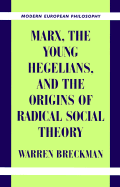Book contents
- Frontmatter
- Contents
- Acknowledgments
- Introduction
- 1 At the End of Idealism: From “Nihilism” to “Positive Philosophy”
- 2 The Transcendent Sovereign and the Political Theology of Restoration
- 3 Ludwig Feuerbach and Christian Civil Society
- 4 The Social and Political Discourse of Personality, 1835–1840
- 5 Pantheism, Social Question, and the Third Age
- 6 Arnold Ruge: Radical Democracy and the Politics of Personhood, 1838–1843
- 7 Karl Marx: From Social Republicanism to Communism
- Conclusion
- Bibliography
- Index
Conclusion
Published online by Cambridge University Press: 11 January 2010
- Frontmatter
- Contents
- Acknowledgments
- Introduction
- 1 At the End of Idealism: From “Nihilism” to “Positive Philosophy”
- 2 The Transcendent Sovereign and the Political Theology of Restoration
- 3 Ludwig Feuerbach and Christian Civil Society
- 4 The Social and Political Discourse of Personality, 1835–1840
- 5 Pantheism, Social Question, and the Third Age
- 6 Arnold Ruge: Radical Democracy and the Politics of Personhood, 1838–1843
- 7 Karl Marx: From Social Republicanism to Communism
- Conclusion
- Bibliography
- Index
Summary
The political theorist Kirstie McClure noted recently the “complicity between the sovereign subject and the sovereign state in modern political theory.” At one level, the Young Hegelians' struggle against the political theology of Restoration Germany seems to support her claim. After all, that contest in the 1830s and 1840s was ultimately a struggle over the complicity between concepts of the self and of sovereignty. On another level, however, this vital episode in the intellectual history of nineteenth-century Germany demonstrates just how complex that complicitous relationship has been. For the discourse of the “sovereign subject” is usually associated with what McClure describes as “the unitary self-present subject of modernity.” In its political form, this translates into the autonomous self of a modern “liberal” discourse that reached its German apogee in the political theory of Kant. Hence, in both the impersonal modern state and the personal self, “sovereignty” rests on the normative assumption of rational, autonomous, self-determining subjectivity. The political theology of the Restoration, by contrast, pursued the reactionary goal of reinvesting the state with personal power, thereby challenging the modern state's trajectory toward impersonal authority. The Restoration rebelled against the rationalist attempt to subordinate sovereignty to a normative order by insisting instead on the transcendence of a sovereign decision maker over any and all rational constraint.
Anti-modern, anti-liberal, and anti-rationalist as its goals were, however, the German Restoration also based its own construction of sovereignty upon a model of the “sovereign subject.”
- Type
- Chapter
- Information
- Marx, the Young Hegelians, and the Origins of Radical Social TheoryDethroning the Self, pp. 298 - 308Publisher: Cambridge University PressPrint publication year: 1998

